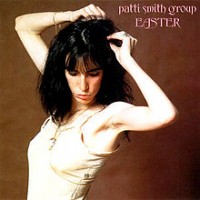It can take a while to get on board with Patti Smith, but she is just as important to the creation of punk as the Stooges or MC5. Still, her tunes, while primal, are not easy rockers. Iggy Pop just wanted to tear things down; Smith was an "artist," and her tunes invoked a lot of strange imagery that put her in league with Jim Morrison. Punk rock was supposed to tear down rock ân' roll in '77, but Smith already did it in '75 when she took Van Morrison's "Gloria" and rewrote the whole damn song for her debut full-length, Horses. Blasphemous despite being the best interpretation, "Gloria" is electrifying from its very first new lines, "Jesus died for somebody's sins / But not mine."
Horses was and is a critical darling, but it didn't exactly move massive units at the time of its release. Neither did its follow-up, Radio Ethiopia. When it came time for LP #3, Easter, Smith opted to make a record that was simultaneously more pop-friendly and more divisive. Now, there are some great tracks here. Opener "Till Victory" is a solid rocker. "Babelogue" has some of Smith's notorious streaming, volatile poetry. The tender, otherworldy "Easter" closes out the record on a somber note. But ultimately, there are two songs that define Easter: "Because the Night" and "Rock n Roll Nigger."
Due to a lawsuit that kept him out of the studio after the success of Born to Run, fellow songwriter Bruce Springsteen was burning with material in the late '70s. One song he had kicking around, "Because the Night," ended up becoming a collaboration with Smith (Springsteen's production partner, Jimmy Iovine, also ended up helming Easter). Springsteen provided the basic lyrical template, but it was Smith that gave this love song its form and feeling. She completed the lyrics and made it her own. Arguably the best known Smith song even to people who don't necessarily recognize Patti Smith's name, "Because the Night" is an epic, emotional journey. It also gave her a bonafide commercial hit without sacrificing any artistic integrity.
"Because the Night" is a catchy pop hit that brought Smith to the mainstream. It also shares space with a song called "Rock n Roll Nigger." That one will never be ready for radio. The song, hereafter referred to as "Rock n Roll N-WORD PLEASE DON'T HATE ME," was Smith's attempt to redefine language. Per the liner notes, that particular word was taken by Smith to apply to "all mutants and the new babes⦠any man who extends beyond the classic form." She meant it as a form of solidarity between artists, but it's pretty hard to casually view it as that since A) she screams with an otherworldly bellow unlike anything else and B) she uses that voice to scream a racial epithet.
I'm of two minds about this song. It's dangerous to play with such a loaded term, even if Smith does explain herself within the context of the song ("Outside of society / They're waiting for me / Outside of society / If you're looking / That's where you'll find me"). Still, even with hip-hop's reclamation of "the n-word," this tune carries some shock to it. Or at least, it does for a nervous white guy like me.
But that doesn't necessarily make it a shock-rock song. Smith had aspirations for evolving the word beyond its hateful origins, just as she sought to push rock ân' roll away from the self-indulgent direction it was headed towards. While she didn't quite do it on her own, she did inspire some young punks along the way. That she could then go out-punk the punks on Easter is a testament to her mastery.
